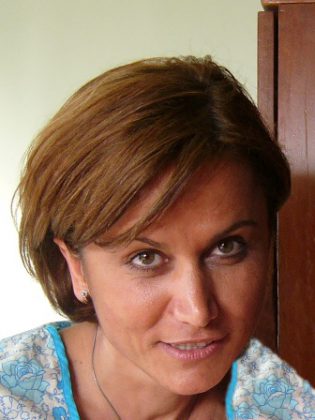
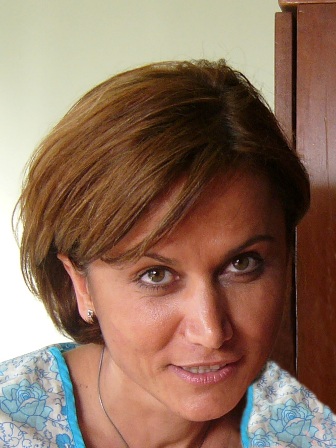 By Meri Martirosyan
By Meri Martirosyan
Azad-Hye
Interview with Nayiri Mgrdichian:
– Tell us please about your life and the path you have gone through. How did it happen that you came to Armenia?
I have been born and raised in Syria. I graduated from Hamazkayin's Higher Armenological Institute. There has been cooperation agreement between that Institute and the Yerevan State University which enabled students to do Master's degree in Armenia. This gave me the chance to come to Armenia and follow that program, which I completed in 2001. My main wish was to come to the motherland; education just gave me the right opportunity to do so.
– What are the values that prevail in your family?
My husband is Lebanese Armenian. We have a four years old child, who has been born in Armenia, the right place. We are trying to live based on the principles that we find correct and acceptable, without excluding also the role the society can play. We are educating our daughter Aregy on these principles. I wish that she grows taking the positive sides of Diaspora education, to become a good individual, good Armenian, receive fine education and become a free in her choices.
– When you first came to Armenia it was normal that people perceived you as a Diaspora Armenian. Did you experience any kind of feeling that they were looking at you with “foreign eyes” or behaving bad with you?
No. I believe that this has to do with the way you behave with people. If you are behaving well, if you are not snubbing them, then nothing of the kind will happen. If you see a problem you should be referring it with regret and with a desire to rectify, not with blunt criticism. In my view, if you decide to live in this country or anywhere else for that reason, you should wear their hat and then try to contribute to the changes.
– According to your view, are Armenian women sufficiently involved in political and public life and generally in other domains?
I believe, in all cases there is a kind of involvement. We can quite often see that the leaders of big companies and associations are women. They do exist also in considerable number in the political domain. I believe in this case also a lot is related to the individual. If you are hard working and you have desire and aspiration to progress you can reach your goals. If there are obstacles they are in front of the men as well.
– How did you start working at tert.am website?
When I came to Armenia, I received a request from Hairenik weekly in USA to be their correspondent in Armenia. I worked for long time with that newspaper then with “Horizon” weekly of Canada, whose correspondent I continue to be. I have worked also in the Ministry of Diaspora as an expert in UN topics. The management of the tert.am decided in 2011 to have a special version in Western Armenian. This was really a great initiative, because it strengthens Armenia-Diaspora ties. I and another colleague are journalist-editors of the Western version until the evening when another colleague continues doing the postings. Generally speaking we post around 60-70 news or articles daily. Although the pace of work is heavy I like it very much. Tert.am/hy is the first and until this date the only website operating in Armenia with Western Armenian language and it is already one year old now. I would like to underline here that the website has very wide audience. We have visitors from Turkey, USA, Canada, Lebanon, Syria and other countries. There are many readers from Armenia itself. Western Armenians looks interesting to them.
– What subjects mainly interest the readers?
I cannot be sure about that; there are many subjects, because we have readers of different ages and interests. When I check the top ten most read articles I cannot hide my pride of our readers. The most read articles are the serious articles, main news about Armenia and Diaspora, new and interesting trends. I would like to mention that every morning we scope the articles and main news published in the Armenian Diaspora media and post the interesting ones with relevant links. We are happy that Diaspora media also re-publishes our news, but mostly without mentioning the source.
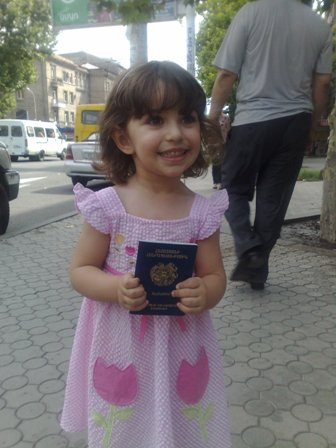 – During the month of March much is said about the role of women. Don't you think that there is a degree of formality in that?
– During the month of March much is said about the role of women. Don't you think that there is a degree of formality in that?
The fact that they are talking about women and giving flowers as gifts at Womens' Day does not define the attitude towards women. I believe that a women must herself find her place in society and be unique. Whatever I have achieved, I have done it with my own efforts and if I desire to do more, I will definitely do. We need to have desire, mind and aspiration. I have found the domain where I feel that I can be very useful and do not see nowadays any need for major changes.
– What about private life? Isn't it compromised by work?
I do not think so. For me priority goes to the family. A well disciplined woman can do both without interrupting each other. If a woman can combine both domains no problem, but if family life will be compromised because of the work, then obviously it is recommended that she quit her job and dedicate herself to her family.
– Are there big differences between Syrian Armenians and Armenians here regarding to national characteristics and other issues?
The differences between Middle East Armenians and specifically Syrian Armenians and Armenia are not big in everyday life issues. There are however differences in terms of national education. Syrian Armenians are very patriotic. Since childhood we are given to understand that Armenia is a sacred land, but when we come to Armenia we come face to face with the reality and realize that there are faulty sides. Gradually however we familiarize ourselves with the new reality and understand that this is a regular country, similar to other countries, and therefore has both good and bad sides. The patriotic education has kept us Armenians. During the process of living in Armenia I learnt that patriotism is the sense of belonging to a country and a nation, where you come from. Patriotism is also the way you incorporate the sense of belonging into lifestyle, regardless of where you live (inside or outside Armenia).
– What would you like to see changed in the Armenian society?
I think there is a lack of state mentality in the Armenian society here, I mean not all are aware that they are citizens of this country. They think that everything the leaders and the state should do for them, while they have nothing to do themselves. I would like to see them more active. I feel sorry for the distortion of the Armenian language. The everyday language and press and TV languages have become similar in tolarating so many foreign words and in adopting expressions translated from Russian.
– Do you think that there are many Armenians in Syria who would like to come to Armenia?
I would like to say that the majority would like to do so. There is always desire for that, if not for living here at least for seeing it, but not always there are sufficient means to make this happen. I am happy that I came here and I am living now here. It is difficult to describe the feeling of a person who has been living far from the motherland to come back and to live in the country where she belongs, where she can feel that everything belongs to her and that she can feel the depth of her roots here. I believe, wherever you live outside your fatherland you will be considered as foreigner anyway.
– What writers you like most?
From the prose writers I like the works of Vazken Shoushanian and from the poets I like Teryan, Charents and Sahyan.
– What is the motto and what are the principles that lead you in life?
First of all you have to be optimistic and to be target-oriented, to have will and aspiration and be hardworking in order to achieve certain objectives in life. You should never be conceited. You should love your family, work, country, environment…
– What would you like to add at the end of this conversation?
I have one wish. To continue living here with my family in our own home and to have apricot and pomegranate trees in our garden. I would like to underline here that living in the motherland is not at all an indication of patriotism or sacrifice, it is rather an enjoyment that God has granted us and I wish He would grant it to all those who wish to live here. There are so many patriotic Armenians who did not have the chance to see their motherland but they live and breathe with Armenia.
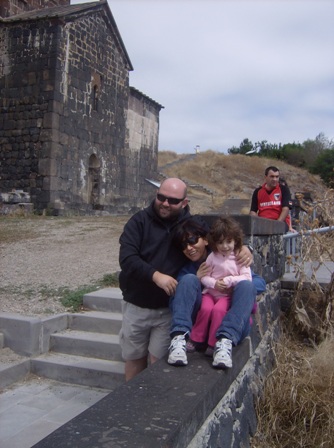 TEXT IN ARMENIAN
TEXT IN ARMENIAN
Նայիրի Մկրտիչեան՝ հայրենասիրութիւնը պատկանելիութեան զգացում է
Պատրաստեց՝ Մերի Մարտիրոսեանը
Հարցազրոյց Նայիրի Մկրտիչեանին հետ
Ազատ-Հայ
– Քիչ մը պատմեցէք ձեր կեանքի, անցած ուղիի մասին: Ինչպէս եղաւ, որ եկաք Հայաստան:
Ծնած ու մեծցած եմ Սուրիոյ Գամիշլի քաղաքի մէջ: Բարձրագոյն կրթութիւնս ստացած եմ Լիբանանի համազգային հայագիտական բարձրագոյն ուսումնական հաստատութենէն: Այդ հաստատութեան եւ Երեւանի պետական համալսարանի միջեւ համագործակցութիւն կար, եւ հնարաւորութիւն կար գալու Հայաստան ու այստեղ ուսումը շարունակելու: Այդպէս որոշեցի ու եկայ Հայաստան, եւ այստեղ ընդունուեցայ կրթութեան կառավարման բաժին (MD), աւարտեցի 2001-ին: Բայց ամենամեծ ցանկութիւնս հայրենիք գալն էր, իսկ ուսումը ուղղակի առիթ հանդիսացաւ:
– Կը պատմէք ձեր ընտանիքի մասին, ի՞նչ արժէքներով կ'առաջնորդուի:
Ամուսինս լիբանանահայ է: Ունինք մէկ աղջիկ, որ արդէն 4 տարեկան է, ծնած է Հայաստան` ճիշտ վայրի մէջ: Կը փորձենք ապրիլ այն սկզբունքներով, որոնք մեզի համար ճիշտ են ու ընդունելի, բայց եւ հասարակութեան դերն ալ չենք անտեսեր: Մեր աղջկան եւս այդպէս կը դաստիարակենք եւ շատ կ'ուզեմ, որ Արեգին Սփիւռքի դաստիարակութեան լաւ կողմերը կրելով, ըլլայ լաւ մարդ, լաւ հայ, ստանայ լաւ կրթութիւն եւ ըլլայ ազատ մարդ` ընտրութիւններու եւ կեանքի տարբեր երեւոյթներու հարցով:
– Երբ եկաք Հայաստան, այստեղ ձեզի իբրեւ սփիւռքահայ կ'ընկալէին: Կա՞ր այնպիսի զգացողութիւն, որ օտար աչքերով կը նայէին կամ վատ կը վերաբերէին:
Ոչ ու կարծեմ, որ անիկա կապ ունի անոր հետ թէ դուն ինչպէս կը վերաբերիս մարդոց հետ: Եթէ ինքզինքդ ճիշտ կը դրսեւորես, մարդոց վերէն չես նայիր, ապա նման խնդիրներ չեն յառաջանար: Եթէ, օրինակ, ինչ որ պրոբլեմ ես տեսնում, ապա դրա մասին պէտք է ցաւով ու շտկելու ցանկութեամբ խօսիս, այլ ոչ` քննադատելու: Իմ կարծիքով երբ կ'որոշես այս երկիրի մէջ կամ այլուր ապրիլ, պէտք է նախ կրես այստեղի գլխարկը եւ յետոյ փորձես լաւ փոփոխութիւններու մէջ ներդրում ունենալ:
– Ըստ ձեզի` հայ կանայք ներկայիս անհրաժեշտ չափով ներգրաւուած են քաղաքական, հասարակական կեանքի մէջ եւ ընդհանրապէս` բոլոր բնագաւառներէն ներս:
Կարծեմ, որ ամէն պարագայի ներգրաւուած են: Յաճախ կարելի է տեսնել, որ խոշոր ընկերութիւններու ու կազմակերպութիւններու ղեկավարները կանայք են, քաղաքական դաշտի մէջ եւս անոնք որոշակի թիւ կը կազմեն: Այս պարագային նոյնպէս անձէն շատ բան կախուած է. եթէ աշխատասէր ես, ունիս ցանկութիւն ու ձգտում, ապա կրնաս հասնիլ քու նպատակներուդ: Այս Երկրի մէջ տեղ հասնելու արգելքներ եթէ կան, անոնք միայն կանանց համար չեն այլ ընդհանուր են:
– Ինչպէ՞ս եղաւ, որ սկսաք աշխատակցիլ tert.am լրատուական կայքին:
Երբ եկայ Հայաստան, Ամերիկայի միացեալ նահանգներու ?Հայրենիք? շաբաթաթերթէն ինծի առաջարկ եղաւ, որ ըլլամ իրենց թերթի լրագրողը Հայաստանի մէջ: Այդպէս երկար տարիներ աշխատեցայ այդ շաբաթաթերթի համար, յետոյ` Գանատայի ?Հորիզոն? թերթի համար, որուն լրագրողն եմ առ այսօր: Ժամանակաւոր ծրագիրով աշխատած եմ նաեւ Սփիւռքի նախարարութենէն ներս, իբրեւ ՄԱԿ-ի փորձագէտ, ծրագիրը աւարտուելէ ետք tert.am կայքի անձնակազը (2011-ին) որոշեց, որ կայքը պէտք է ունենայ նաեւ արեւմտահայերէն բաժին: Այդ նախաձեռնութիւնը ինծի համար շատ ողջունելի է, քանի որ tert.am/hy կայքը այսօր Հայաստան-Սփիւռք կապերու ամրապնդման կարեւոր օղակներէն մէկն է: Երկու հոգիով արեւմտահայերէն բաժնի լրագրող-խմբագիրներ ենք մինչեւ երեկոյեան, ապա երրորդ մը կը շարունակէ լուրերու տեղադրումը: Ընդհանուր առմամբ, օրուան ընթացքին 60-էն 70 լուր եւ յօդուած կը տեղադրենք: Հակառակ անոր, որ աշխատանքի հեւքը շատ է, սակայն աշխատանքս շատ կը սիրեմ: tert.am/hy Հայաստանի մէջ գործող արեւմտահայերէն առաջին եւ առայժմ միակ կայքն է եւ արդէն առաւել քան մէկ տարեկան է: Ըսեմ նաեւ, որ կայքը ընթերցողներու մեծ լսարան ունի. Ընթերցողներ ունինք Թուրքիայէն, ԱՄՆ-էն, Գանատայէն, Լիբանանէն, Սուրիայէն ու մի քանի այլ երկիրներէ: Ընթերցողները շատ են նաեւ Հայաստանէն. Անոնք միայն սփիւռքահայեր չեն, կարգ մը հայաստանցիներու համար նոյնպէս հաճելի է արեւմտահայերէն կարդալ:
– Գլխաւորաբար որ թեմաները առաւել շատ կը հետաքրքրեն ընթերցողները:
Ընդհանրական ձեւով դժուար է ըսել, ամենատարբեր թեմաները, որովհետեւ տարբեր տարիքի ու նախասիրութիւններու ընթերցողներ ունինք: Վստահ կրնամ ըսել, երբ կը նայիմ ամենաշատ ընթերցուած նիւթերու տասնեակին, պարզապէս կը հպարտանամ մեր ընթերցողներով, առեւելաբար կ'ընթերցուին լուրջ յօդուածներ, Հայաստանին ու հայութեան վերաբերող կարեւոր լուրեր, ինչպէս նաեւ հետաքրքրական այլ նորութիւններ: Նշեմ նաեւ, որ մենք ամէն առաւօտ կը ծանօթանանք նաեւ Սփիւռքի թերթերուն եւ կարեւոր յօդուածներն ու լուրերը կը հրապարակենք մեր կայքի մէջ բնականաբար յղում կատարելով: Ի ուրախութիւն մեզ Սփիւռքի թերթերը նոյնպէս կ'արտատպեն մեր լուրերը, բայց շատ յաճախ առանց յղումի:
– Կանանց միամսեակն է եւ այս ընթացքին աւելի յաճախ կը խօսուի կնոջ դերի մասին: Չէք կարծեր, որ ասիկա ունի նաեւ իր ձեւական կողմը:
Երբ կանանց տօնին կը խօսին անոնց մասին, ծաղիկ կը նուիրեն, անով դեռ չի որոշուիր կնոջ հանդէպ վերաբերումը: Միւս կողմէ կը կարծեմ, որ կինը ինք պէտք է իր տեղը գտնէ հասարակութեան մէջ եւ ինքնուրոյն ըլլայ: Այն, ինչին ես հասած եմ, հասած եմ սեփական ջանքերով ու եթէ ուզեմ աւելիին հասնիլ, անպայման կը հասնիմ: Պէտք է ցանկութիւն, խելք ու ձգտում ունենալ: Հիմա ես իմ տեղս գտած եմ, գիտեմ, որ օգտակար եմ այս ոլորտի մէջ եւ առայժմ մեծ փոփոխութիւններ ընելու կարիք չեմ զգար:
– Իսկ այդ պարագային անձնական կեանքը չի տուժեր:
Չեմ կարծեր: Ինծի համար առաջնայինը ընտանիքն եւ կազմակերպուած կինը կրնայ այնպէս ընել, որ մէկը միւսը չխանգարէ: Եթէ կինը կարողութիւն ունի երկուքը համատեղելու թող ընէ, իսկ եթէ աշխատանքի պատճառով ընտանիքը պիտի տուժէ պէտք է ձգել աշխատանքը եւ նուիրուիլ ընտանիքին:
– Սուրիոյ եւ Հայաստանի միջեւ տարբերութիւնները` ազգային դիմագիծի եւ մնացած հարցերու առումով շա՞տ են:
Կարծեմ ընդհանրապէս Մերձաւոր Արեւելքի, եւ յատկապէս` Սուրիոյ ու Հայաստանի միջեւ տարբերութիւնները կենցաղային առումով այնքան ալ մեծ չեն: Ազգային դաստիարակութեան տեսանկիւնէն տարբերութիւն կայ: Սուրիահայութիւնը շատ հայրենասէր է: Մեզի մանկութենէն հայրենիքը կը ներկայացնեն իբրեւ սրբավայր, սակայն երբ կու գաանք Հայաստան` կը բախինք իրականութեան հետ ու կը տեսնենք, որ կան թերութիւններ, բայց կամաց-կամաց կ'ընտելանանք ու կը հասկնանք, որ այս ալ սովորական երկիր է` միւսներու նման, եւ բնականաբար ունի թէ լաւ, թէ վատ կողմեր: Սակայն այդ հայրենասիրական դաստիարակութիւնը մեզի հայ պահեց: Ըսեմ, որ Հայաստան ապրելու այս ընթացքին հասկցայ, որ հայրենասիրութիւնը պատկանելիութեան զգացում է, պատկանելիութիւն այն երկրին ու ազգին, որմէ ծնած ես: Հայրենասիրութիւնը նաեւ այդ պատկանելիութեան զգացումը (կապ չունի, թէ ուր կ'ապրիս Հայաստանէն ներս կամ դուրս) ապրելակերպի վերածելն է:
– Ի՞նչը կ'ուզէիք փոխել հայ հասարակութեան մէջ:
Հայաստանի հասարակութեան մէջ պետական մտածողութիւն պակաս կայ, այսինքն` բոլորը չէ, որ կը գիտակցին այն, որ իրենք այս երկրի տէրն են, այս երկրի քաղաքացին են: Կը մտածեն, որ ամէն ինչ պէտք է իշխանութիւնն ու պետական այրերը փոխեն, իսկ իրենք ընելիք չունին: Կ'ուզէի նաեւ, որ աւելի աշխատասէր ըլլան, Ինծի համար ցաւ է նաեւ մայրենի լեզուի աղաւաղումը, այստեղ խօսակցական եւ մամուլի ու հեռուստատեսութեան լեզուները գրեթէ նոյնացած եւ ողողուած են օտար բառերով ու ռուսերէնէ թարգմանուած դարձուածքներով:
– Սուրիոյ մէջ շա՞տ են հայերը, որոնք Հայաստան գալու ցանկութիւն ունին:
Այո, կրնամ ըսել, որ մեծամասնութիւնը: Ցանկութիւնը միշտ ալ կայ, եթէ ոչ ապրելու, ապա` գոնէ տեսնելու, սակայն միշտ չէ, որ միջոցները կը բաւարարեն: Ես ուրախ եմ, որ եկայ ու կ'ապրիմ այստեղ, անբացատրելի երջանկութիւն է իր հայրենիքէն հեռու ապրողի համար գալ ու ապրիլ այն երկրի մէջ, որուն կը պատկանիս, կը զգաս, որ ամէն ինչ քեզի կը պատկանի, եւ մինչեւ ծունկներդ խրուած ես այդ հողի մէջ ու հասած քու արմատներուդ: Կարծեմ` եթէ հայրենիքէն հեռու ես, որ երկրի մէջ ալ ապրիս` ամէն պարագայի օտար ես:
– Ո՞ր գրողը կը սիրէք:
Արձակագիրներէն Վազգէն Շուշանեանի գործերը, բանաստեղծներէն` Տէրեան, Չարենց եւ Համօ Սահեան:
– Կեանքի մէջ ինչո՞վ կ'առաջնորդուիք , ի՞նչ նշանաբանով կամ սկզբունքներով:
Նախ պէտք է լաւատես ու նպատակասլաց ըլլալ, ունենալ կամք, ձգտում եւ ըլլալ աշխատասէր` կեանքի մէջ բանի մը հասնելու համար, երբեք չմեծամտանալ ու սիրել? սիրել ընտանիքը, աշխատանքը, երկիրը, շրջապատը:
– Ի՞նչ կ'ուզէք աւելցնել զրոյցի աւարտին:
Մէկ ցանկութիւն ունիմ. Կ'ուզեմ շարունակել ապրիլ այստեղ`ընտանիքիս հետ միասին` մեր սեփական տան մէջ, եւ բակի մէջ անպայման ծիրանենի ու նռնենի տնկել: Կ'ուզեմ նաեւ նշել, որ հայրենիքի մէջ ապրիլը երբեք հայրենասիրութեան ցուցանիշ կամ զոհողութիւն չէ, այլ վայելք, զոր Աստուած շնորհած է մեզի եւ կը մաղթեմ, որ շնորհէ բոլոր անոնց, որոնք ունին այդ ցանկութիւնը? Այնքա՜ն հայրենասէրներ կան, որոնք իրենց հայրենիքը տեսնելու անգամ հնարաւորութիւն չեն ունեցած, բայց կ'ապրին ու կը շնչեն Հայաստանով?
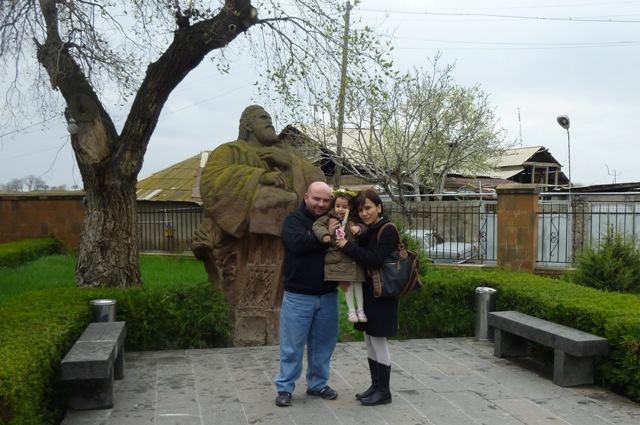 |
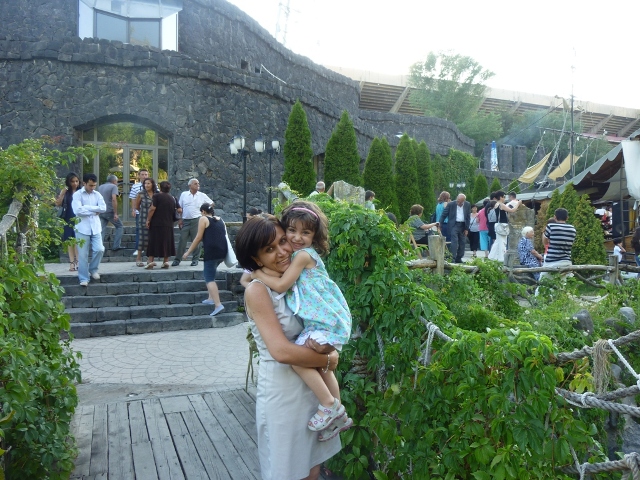 |
